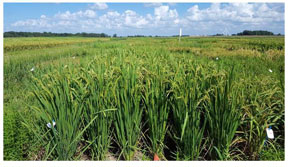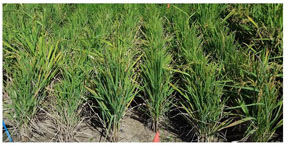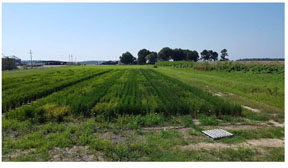| Rice Abiotic Stress Tolerance, page 2 |

|
Research Approach, cont'd
II. Identifying agronomic traits that can deliver high and quality yield under AWD: Evaluate the performance of various rice varieties and breeding lines for grain yield, disease tolerance, weed suppression, and root development under AWD water management in field and greenhouse studies. Collaborators: Anna McClung, Jeremy Edwards, Yulin Jia, and Georgia Eizenga.
 |
 |
|
Example of high yield potential by the variety Teqing (indica type) under AWD water management system at ARS research plot. |
Example of poor agronomic performance of variety Lemont (tropical japonica type) under AWD water management system at ARS research plot. |
IIa. Greenhouse and Drip irrigation studies: Studies are being conducted under controlled environments where precise amounts of irrigation can be applied to monitor the genetic response to water stress. Collaborators: Anna McClung, Chris Henry (UA), and Shannon Pinson (USDA ARS retired).
 |
 |
|
Performance of Teqing, Lemont and their selected progenies being evaluated for agronomic, physiological and grain quality traits under AWD water management system in a controlled-environment settings. |
This picture shows the drip irrigation study conducted in collaboration with U of A where 20 rice cultivars are being evaluated under four different continuous soil moisture levels (~45%, 35%, 25%, and 15% volumetric water content). |
IIb. Getting to the ROOTS of AWD-stress tolerance: Roots could play a critical role in plant’s adaptations to decreasing soil moisture conditions, but in past at DBNRRC it was not a research focus because conventionally rice is grown under flooded conditions. Now, we are developing a strategic interest in studying root system architecture (RSA) for improving rice performance under AWD water management system. We are studying genetics of root structural traits that may influence rice physiology, agronomic productivity, and grain quality traits. This will help us to improve plasticity of rice plant under AWD water management system.
Click here to see additional information on Research Approach.
Click here to return to main page of Rice Abiotic Stress Tolerance project.

